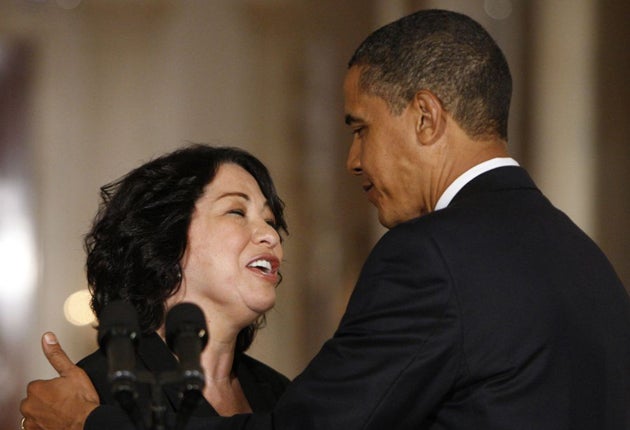First Hispanic judge bound for Supreme Court bench
Nomination of Sonia Sotomayor will see one liberal replace another

Your support helps us to tell the story
From reproductive rights to climate change to Big Tech, The Independent is on the ground when the story is developing. Whether it's investigating the financials of Elon Musk's pro-Trump PAC or producing our latest documentary, 'The A Word', which shines a light on the American women fighting for reproductive rights, we know how important it is to parse out the facts from the messaging.
At such a critical moment in US history, we need reporters on the ground. Your donation allows us to keep sending journalists to speak to both sides of the story.
The Independent is trusted by Americans across the entire political spectrum. And unlike many other quality news outlets, we choose not to lock Americans out of our reporting and analysis with paywalls. We believe quality journalism should be available to everyone, paid for by those who can afford it.
Your support makes all the difference.Sonia Sotomayor is set to become the first Hispanic member of the US Supreme Court after her nomination yesterday by President Barack Obama drew enthusiastic support from Democrats and pledges by Republicans that they would give her a fair hearing in a Senate where the party is a dwindling minority.
In practical terms, Ms Sotomayor, a federal appeals judge who grew up in poverty in the Bronx, will see one liberal – departing Justice David Souter – replaced with another. She will join Ruth Bader Ginsburg as the second woman on the nine-person court, and at 54 will provide an injection of relative youth and energy to its liberal contingent, whose most senior member, John Paul Stevens, is now 89.
Accepting the nomination at the White House yesterday Ms Sotomayor said that "my heart today is bursting with gratitude", describing the moment as "the most humbling honour of my life". Mr Obama for his part praised her "rigorous intellect" and "mastery of the law". She was also a judge, he noted, "who recognised the limits of the judicial role".
That last observation was a nod to Republicans, who habitually criticise liberal jurists for attempting to legislate from the bench. Even so some conservative groups railed against her selection on the grounds she would do exactly that. "A liberal judicial activist of the first order who thinks her own personal political agenda is more important than the law as written," was the verdict of Wendy Long, of the Judicial Confirmation Network organisation. Despite such mutterings, Ms Sotomayor's confirmation by the Senate is not in serious doubt, barring some glaring mistake on her part or the unlikely emergence of a scandal. The last Supreme Court appointment to fail was that by George Bush in October 2005 of his White House counsel Harriet Miers – not because of Democratic opposition, but as a result of objections from many of his own party that she was simply not up to the job.
Such criticism cannot be levelled at Ms Sotomayor, a jurist of vast practical experience who was appointed a federal judge in New York by the first President Bush in 1991, and elevated to the appeals bench by Bill Clinton in 1997. Two years earlier she briefly achieved national fame as the judge who delivered the ruling against baseball's owners and in favour of the players' union which ended a strike that caused the first and only cancellation of the World Series in 1994. Not by coincidence, Ms Sotomayor is an avid baseball fan.
Republicans may not be delighted by the arrival of a liberal on the highest court. But she will not change its ideological balance between four reliably conservative justices, led by Chief Justice John Roberts, and four who generally take a liberal line. In the middle is Justice Anthony Kennedy, the current "swing vote" on the court, but who tends more often than not to side with the conservatives.
There are big political risks should the Republicans try to block Ms Sotomayor's confirmation. A Hispanic justice on the country's highest court is by common consent long overdue and Republicans might alienate a fast-growing sector of the electorate should they oppose her.
Join our commenting forum
Join thought-provoking conversations, follow other Independent readers and see their replies
Comments